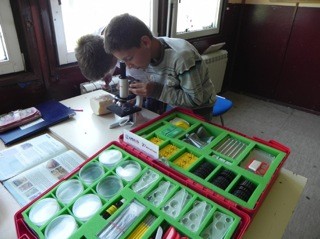
With nearly 200 families, Babin Most/Babimoc is one of the most populated Kosovo Serb villages in the municipality of Obilić/Obiliq. There is only one elementary school in the village, attended by 98 students and preschool children. Although the children are keen to learn, the school is lacking equipment, while the building is in poor condition and hasn’t seen any recent investment.
To improve their learning conditions, USAID’s Community Action Initiative Program assisted this community to purchase new educational tools to help children succeed in biology, chemistry and physics. Biology teacher Duška Radojević says that before this donation, apart from a few posters, the school’s children didn’t have any educational tools for practical learning in science. “Earlier, my students never saw even a magnifying glass. Now, we have a biology research toolbox, a microscope, one human skeleton model and a human internal organs model. Now, when I talk about single-celled organisms, students can actually see what they look like. The children are delighted,” Radojević says.
One of the students, Milorad Igić, says that he loves science and these tools make the learning process so much easer. “I love using microscope, and now I can’t imagine biology class without it. It makes learning so much easier and more interesting,” he said.
The school also received two research toolboxs—one for its course in chemistry and the other for its course in physics. It also received a pendulum, which will help to expand the students' concepts of motion and gravitational force.
USAID Community Action Initiative Program started in July 2010 and ends July 2014. It supports community development and infrastructure rehabilitation in 40 Kosovo communities, builds strong civil society organizations, and improves economic and employment opportunities.







Comment
Make a general inquiry or suggest an improvement.